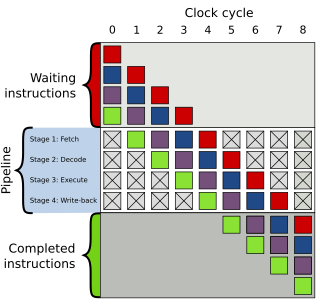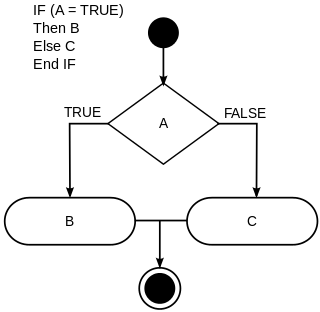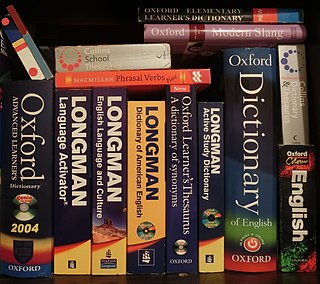
In probability theory and statistics, Bayes' theorem describes the probability of an event, based on prior knowledge of conditions that might be related to the event. For example, if cancer is related to age, then, using Bayes' theorem, a person's age can be used to more accurately assess the probability that they have cancer, compared to the assessment of the probability of cancer made without knowledge of the person's age.
Deductive reasoning, also deductive logic, logical deduction is the process of reasoning from one or more statements (premises) to reach a logically certain conclusion.

In computer architecture, a branch predictor is a digital circuit that tries to guess which way a branch will go before this is known definitively. The purpose of the branch predictor is to improve the flow in the instruction pipeline. Branch predictors play a critical role in achieving high effective performance in many modern pipelined microprocessor architectures such as x86.

In computer science, conditional statements, conditional expressions and conditional constructs are features of a programming language, which perform different computations or actions depending on whether a programmer-specified boolean condition evaluates to true or false. Apart from the case of branch predication, this is always achieved by selectively altering the control flow based on some condition.
A counterfactual conditional, is a conditional containing an if-clause which is contrary to fact. The term "counterfactual conditional" was coined by Nelson Goodman in 1947, extending Roderick Chisholm's (1946) notion of a "contrary-to-fact conditional". The study of counterfactual speculation has increasingly engaged the interest of scholars in a wide range of domains such as philosophy, human geography, psychology, cognitive psychology, history, political science, economics, social psychology, law, organizational theory, marketing, and epidemiology.
Conditional sentences are sentences expressing factual implications, or hypothetical situations and their consequences. They are so called because the validity of the main clause of the sentence is conditional on the existence of certain circumstances, which may be expressed in a dependent clause or may be understood from the context.
In probability theory and statistics, given two jointly distributed random variables
and
, the conditional probability distribution of Y given X is the probability distribution of
when
is known to be a particular value; in some cases the conditional probabilities may be expressed as functions containing the unspecified value
of
as a parameter. When both
and
are categorical variables, a conditional probability table is typically used to represent the conditional probability. The conditional distribution contrasts with the marginal distribution of a random variable, which is its distribution without reference to the value of the other variable.

In probability and statistics,
density estimation is the construction of an estimate, based on observed data, of an unobservable underlying probability density function. The unobservable density function is thought of as the density according to which a large population is distributed; the data are usually thought of as a random sample from that population.

The material conditional is a logical connective that is often symbolized by a forward arrow "→". The material conditional is used to form statements of the form p → q which is read as "if p then q". Unlike the English construction "if... then...", the material conditional statement p → q does not conventionally specify a causal relationship between p and q; "p is the cause and q is the consequence from it" is not a generally valid for interpretation p → q). It merely means "if p is true, then q is also true" such that the statement p → q is false only when both p is true and q is false. In a bivalent truth table of p → q, if p is false, then p → q is true regardless of whether q is true or false since (1) p → q is always true as long q is true and (2) p → q is true when both p and q are false. This truth table is useful to prove some mathematical theorems.
In computer programming, ?: is a ternary operator that is part of the syntax for basic conditional expressions in several programming languages. It is commonly referred to as the conditional operator, inline if (iif), or ternary if. An expression a? b : c evaluates to b if the value of a is true, and otherwise to c.
A suspended sentence is a legal term for a judge's delaying of a defendant's serving of a sentence after they have been found guilty, in order to allow the defendant to perform a period of probation. If the defendant does not break the law during that period, and fulfills the particular conditions of the probation, the judge usually dismisses the sentence.
A branch is an instruction in a computer program that can cause a computer to begin executing a different instruction sequence and thus deviate from its default behavior of executing instructions in order. Branch may also refer to the act of switching execution to a different instruction sequence as a result of executing a branch instruction. Branch instructions are used to implement control flow in program loops and conditionals.
The conditional mood is a grammatical mood used to express a proposition whose validity is dependent on some condition, possibly counterfactual. It thus refers to a distinct verb form that expresses a hypothetical state of affairs, or an uncertain event, that is contingent on another set of circumstances. An example of a verb in the conditional mood is the French aimerait, meaning "would love".

In Christian theology, conditionalism or conditional immortality is a concept in which the gift of immortality is attached to belief in Jesus Christ. This doctrine is based in part upon another theological argument, that the human soul is naturally mortal, immortality is therefore granted by God as a gift. This viewpoint stands in contrast to the more popular doctrine of the "natural immortality" of the soul. Conditionalism is usually paired with mortalism and annihilationism, the belief that the unsaved will be ultimately destroyed and cease to exist, rather than suffer unending torment in hell. The view is also connected with the idea of soul sleep, in which the dead sleep unconscious until the Resurrection of the Dead to stand for a Last Judgment before the World to Come.
The International Knockout Mouse Consortium (IKMC) is a scientific endeavour to produce a collection of mouse embryonic stem cell lines that together lack every gene in the genome, and then to distribute the cells to scientific researchers to create knockout mice to study. Many of the targeted alleles are designed so that they can generate both complete and conditional gene knockout mice.
The IKMC was initiated on March 15, 2007 at a meeting in Brussels. By 2011, Nature reported that approximately 17,000 different genes have already been disabled by the consortium, "leaving only around 3,000 more to go".
In probability theory, conditional probability is a measure of the probability of an event given that another event has occurred. If the event of interest is A and the event B is known or assumed to have occurred, "the conditional probability of A given B", or "the probability of A under the condition B", is usually written as P(A | B), or sometimes PB(A) or P(A / B). For example, the probability that any given person has a cough on any given day may be only 5%. But if we know or assume that the person has a cold, then they are much more likely to be coughing. The conditional probability of coughing by the unwell might be 75%, then: P(Cough) = 5%; P(Cough | Sick) = 75%
Payment order, in international banking, is a directive to a bank from a bank account holder instructing the bank to make a payment or series of payments to a third party.

As is typical for many languages, full conditional sentences in English consist of a condition clause or protasis specifying a condition or hypothesis, and a consequence clause or apodosis specifying what follows from that condition. The condition clause is a dependent clause, most commonly headed by the conjunction if, while the consequence is contained in the main clause of the sentence. Either clause may appear first.

The 2015 NHL Entry Draft was the 53rd NHL Entry Draft. The draft was held on June 26–27, 2015, at the BB&T Center in Sunrise, Florida. The first three selections were Connor McDavid going to the Edmonton Oilers, Jack Eichel going to the Buffalo Sabres, and Dylan Strome going to the Arizona Coyotes.

The 2016 NHL Entry Draft was the 54th NHL Entry Draft. The draft was held on June 24–25, 2016 at the First Niagara Center in Buffalo, New York. The first three selections were Auston Matthews going to the Toronto Maple Leafs, Patrik Laine going to the Winnipeg Jets, and Pierre-Luc Dubois going to the Columbus Blue Jackets.








